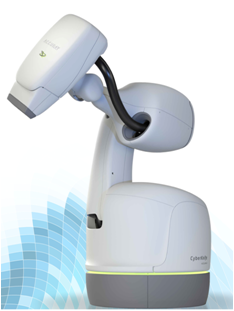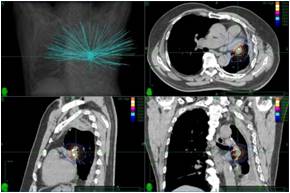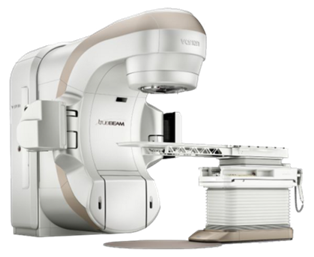Services and Features
We provide outpatient/inpatient radiation therapy, combined chemotherapy and radiotherapy for some cancers, outpatient hospice care, holistic health care, and education for the public.
Over the years, we have continuously refined radiation therapy techniques to deliver the highest-quality patient care and better cure rate.
We are skilled in a wide range of standard and novel treatments, including: concomitant chemoradiotherapy (CCRT) for nasopharyngeal carcinoma, head and neck cancers, esophageal cancer, cervical cancer; "sandwich" therapy strategy (preoperative induction chemotherapy, surgery followed by postoperative adjuvant radiotherapy) for locoregionally advanced oral cancers.
Taichung Veterans General Hospital meets the strict standards for a national health institute comprehensive cancer center, which recognizes scientific excellence, a strong research program and a multidisciplinary approach to cancer prevention, diagnosis and treatment. Our radiation oncologists have been specialized in their chosen fields by concentrating their individual practices on the treatment of different types of cancers.
We cooperate with neurosurgeons and radiologists for the treatment of brain tumors and intracranial vascular diseases; with orthopedists for post-operative brachytherapy and external beam radiation therapy for soft tissue sarcomas; with hematologists to deliver total body irradiation followed by stem cell transplantation in the treatment of leukemia and lymphoma.
With regard to advanced technology such as the most current linear accelerators and latest computed tomography camera, we have developed and refined three-dimensional conformal radiotherapy and intensity-modulated radiation therapy, and image-guided radiotherapy in recent years. By using these new technologies that are available to "map" tumors, our radiation oncologists can design treatments with pinpoint accuracy, ensuring that tumors get the most effective dose, thus enhancing treatment outcomes while healthy tissues and organs are spared, reducing acute and late toxicities.
- CyberKnife System
The CyberKnife System is an image-guided linear accelerator that was specifically designed to deliver Stereotactic radiosurgery (SRS) and Stereotactic body radiation therapy (SBRT). It is the precision of the system, delivered by its robotic arm, and real-time adaptive delivery of the radiation beam to the tumor throughout treatment, that makes such a difference for patients. CyberKnife accuracy is sub-millimetric, which can help significantly reduce the risk of the side effects that too often disrupt the lives of patients during and after treatment.


- Vital Beam
The intelligent control system of VitalBeam® synchronizes and monitors the system’s fully integrated features such as imaging, treatment and motion management so the doctor can efficiently and accurately deliver high quality treatment. With its high intensity mode (3 photon and 6 electron energies) the VitalBeam® is precise, fast and safe. VitalBeam® offers High-Intensity Mode (Flattening Filter Free) technology for faster treatments of complex cases. VitalBeam® combines intensity modulated radiotherapy (IMRT) and image-guided radiation therapy (IGRT), for image guidance and respiratory gating for motion management. It includes adaptive Rapidarc technology for faster IMRT, higher dose delivery system and cone-beam CT (CBCT) imaging system.


- Accelerated partial breast irradiation, APBI
Breast conservation surgery followed by whole breast irradiation has been established as a standard of care for the treatment of early stage breast cancer and is associated with excellent local control and overall survival. Compared to conventional 5 to 6 weeks whole breast radiotherapy, the advantages of APBI include a shorter treatment course and better cosmetic outcomes. (Note: APBI is not generally applied to all breast cancer patients. The patient should consult the radiation oncologist for the indication.)


- Multi-specialist teamwork
The standard treatments for cancers consist of surgery, chemotherapy and radiotherapy. Taichung Veterans General Hospital values the importance of Multi-specialist teamwork. There are Multi-specialist teams for lung cancer, head and neck cancer, hematology cancer, children cancer, breast cancer, prostate cancer, bladder cancer, liver cancer, colon-rectum cancer, gastric cancer, genitourinary cancer, skin cancer, thyroid cancer, esophageal cancer, gynecologic cancer, and pancreatic cancer.